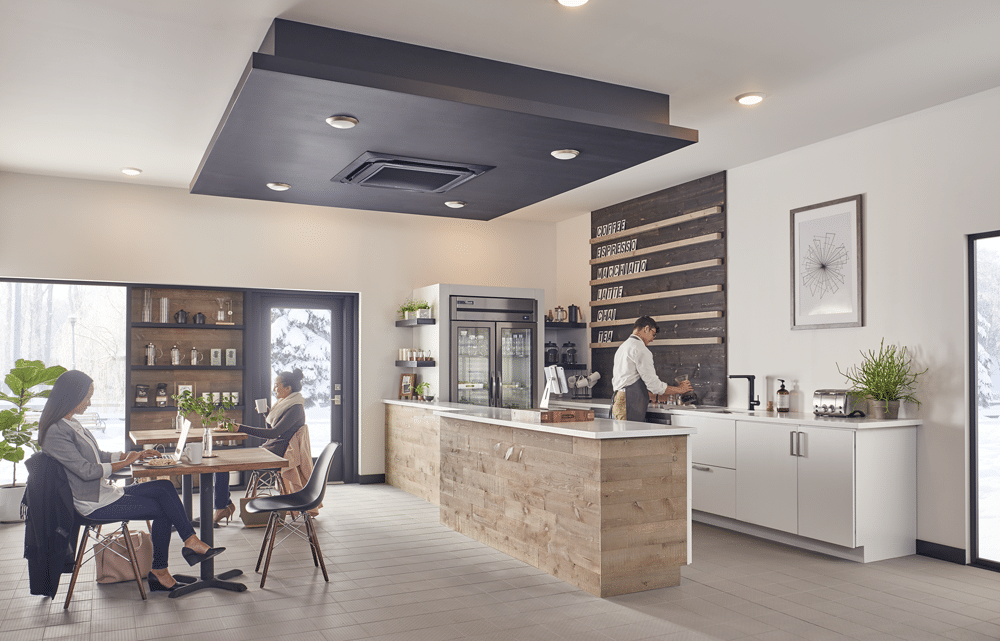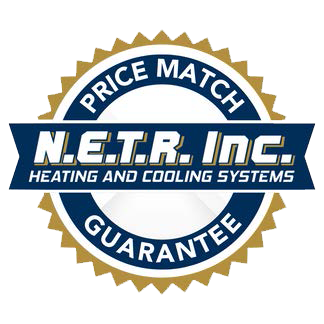When we talk with commercial clients, we tend to hear a lot of the same questions. If you’re thinking about investing in a commercial HVAC system, check out the following FAQs about commercial HVAC systems and how they work.

What Is Commercial HVAC?
A commercial HVAC system provides heating, ventilation, and air conditioning to a commercial building. Usually, these systems have relatively large outdoor units that sit on roofs, but some commercial ductless systems feature slim outdoor units that can fit alongside of buildings or even on window ledges.
What Are the Types of Commercial HVAC Systems?
There are several different types of commercial HVAC systems, and they all heat, cool, and ventilate spaces slightly differently. Three of the most common commercial HVAC systems include the following:
- Single split ductless systems
- Multi-split ductless systems
- Variable Refrigerant Flow (VRF) or Variable Refrigerant Velocity (VRV) Systems
Both single and multi-split ductless units feature an outdoor unit with a condenser connected to an indoor air handling unit. The single split just has a single indoor unit, making it ideal for relatively small commercial spaces such as freestanding stores, small medical clinics, and similar spaces. In contrast, a multi-split system features multiple indoor air handling units which can each be controlled separately.
VRF and VRV can refer to heat pump and heat recovery systems. These systems only use refrigerant — they don’t rely on water like commercial chiller systems. They also feature an inverter and several indoor air handling units.
How Do Commercial HVAC Systems Work?
All the above commercial HVAC systems work by moving heat rather than generating it. Heat pumps rely on the same principle as refrigerators. They run refrigerant through tubes, and the tubes absorb the heat in an area. Then, the refrigerant travels to another part of the system and releases that heat into the air.
During the winter, commercial HVAC systems gather heat from the outside and bring it inside your commercial space. Technological advances in ductless HVAC systems and heat pumps now make it possible to gather heat from the outside even when temps are extremely low. In the summer, the system works in reverse, moving heat from the inside of your building to the outside.
How Do You Clean Commercial HVAC Coils?
The coils of a commercial HVAC system contain refrigerant that absorbs heat as explained above. If dirt or debris builds up on the coils, that creates an insulating layer which disrupts the coil’s ability to absorb heat efficiently. To prevent this from happening, you should clean the coils on your commercial HVAC system on a relatively regular basis.
To clean the coils, you can spray down the outside of the system or have a commercial HVAC system professional clean the coils during a routine maintenance check.
How Much Does Commercial HVAC Cost?
Commercial HVAC systems vary in cost depending on the size of your building, your coiling needs, the type of HVAC system you select, and multiple other factors. When assessing the cost of new commercial HVAC equipment, don’t just look at the upfront price tag. Instead, also consider the cost of running and maintaining the HVAC equipment.
If you’re on the fence about whether investing in new HVAC equipment is cost effective, talk with a commercial HVAC expert. They can help you compare the costs of maintaining, repairing, and operating old inefficient equipment with the cost of investing in new equipment.
How Do You Size Commercial HVAC Systems?
The size of your commercial HVAC system depends on the size of the space you need to heat and cool. If you get a system that is too small, it must run continuously, creating unnecessary wear and tear on the unit, and even then, it may not be able to make your space comfortable. Overly powerful HVAC equipment tends to cycle on and off too frequently, also creating unnecessary wear and tear and driving up your bill.
In addition to considering the size of your commercial space, your HVAC contractor should also consider other factors that affect the heat gain or loss in your building. That includes passive solar heat gain, the effect insulation has on your building, and equipment generating heat.
What Does a Commercial HVAC Tech Do?
A commercial HVAC technician can repair existing HVAC equipment, install new thermostats, help you choose new HVAC equipment, and handle HVAC installation. These professionals can also help to maintain your equipment with regular service appointments which include the following:
- Inspecting the system
- Cleaning internal and external HVAC components
- Adjusting screws, belts, and other parts
- Checking refrigerant levels
- Topping up fluids
- Straightening fins
- Making sure fans work correctly
- Calibrating thermostats as needed
- Inspecting ductwork
- Changing filters
- And more
When you schedule routine maintenance for your commercial HVAC system, you help to boost the lifespan of your equipment, and you also get to learn about potential issues before they cause your system to stop working.
At N.E.T.R., Inc., we are experienced commercial HVAC contractors who can help with everything from installing new HVAC equipment to servicing and repairing existing equipment. To get help with your commercial HVAC needs, contact us today.
